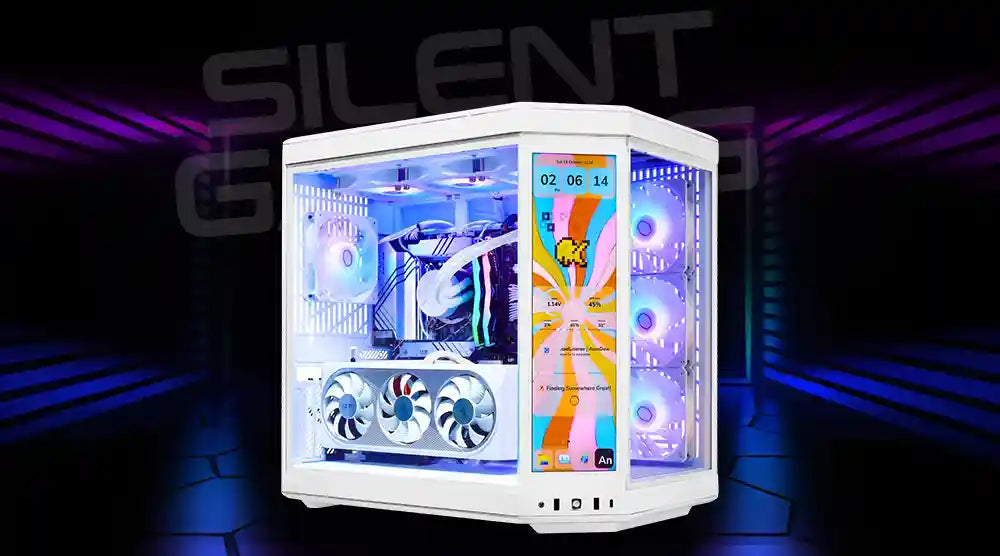Who doesn't want an extremely powerful gaming computer? The type that is able to play the newest AAA games with the highest quality settings, or the most demanding tasks, without even getting hot.
Usually, the drawback of such a power is noise. The weird sound of a gaming PC under heavy use has become a common thing for us all. However, this is not the case anymore! A silent gaming PC is the real winner, as it gives you incredible performance along with a quiet and calm atmosphere.
This blog covers how to build a silent gaming PC without sacrificing aesthetics, cooling performance, or speed, from choosing the right components to cable management and soundproofing.
Let's dive in!
Why Build A Silent Gaming PC?
Building a silent computer is about performance and durability in addition to calm:
- Focus: Silence helps you remain focused during competitive gaming, editing, or streaming sessions.
- Extended component life: Reduced vibrations and effective cooling increase component life.
- Perfect for shared rooms: Good for late-night gaming without disrupting others.
- Professional appeal: Editors, office users, and streamers value a tranquil, noise-free setting.
A silent system means smarter design, not worse performance. With the right combination of parts and noise management, your computer can run cool, silent, and strong.
Pick The Appropriate PC Casing To Lower Noise
The case lays the groundwork for silence. Pick a PC case with noise-dampening:
- Side panel acoustic foam padding.
- Vibration-absorbent solid steel or aluminum panels.
- Front mesh or improved airflow design to lessen fan stress.
Brands such as Fractal Design and NZXT provide silent-optimized cases. Designed for calm builds, cases from Technoid Inc. also include premium dampening layers and ventilation channels.
Choose Cooling Systems That Generate Low Noise
System noise is largely brought on by cooling; with low-noise cooling solutions, like those found in the following, you can get silence.
- 120mm or 140mm bigger fans provide more air at lower RPMs, hence minimizing turbulence and noise.
- For CPU and GPU cooling with little noise, liquid cooling (AIO or custom) is perfect.
- PWM Fan Control dynamically modifies fan speeds depending on temperature.
- Prevent fans from resonating against metal panels by means of anti-vibration rubber mounts.
Tip: Software programs like Fan Control or MSI Afterburner aid in fine-tuning fan speeds for the best sound.
Pick Energy-Efficient Components
Modern CPUs and GPUs are incredibly powerful, but their noise output often depends on how efficiently they use power. When components generate less heat, fans don’t need to work as hard, resulting in a quieter system.
Look for:
- Undervolted or power-optimized CPUs and GPUs.
- Advanced power management features.
- Motherboards with strong, efficient VRMs.
A more energy-efficient setup produces less heat, allowing fans to run at lower speeds. This leads to quieter performance, improved stability, and longer component lifespan.
Opt For Silent Or Semi-Passive Power Sources
Though often overlooked, the power supply can be a major contributor to system noise. Choose a PSU designed for quiet performance:
- 80+ Gold or Platinum efficiency to reduce heat and minimize fan usage.
- “Zero RPM” or “Eco Mode” features, where the fan stays off during light loads.
- Trusted quiet PSU brands such as Seasonic, Corsair, and Be Quiet.
These power supplies only activate their fans when temperatures rise significantly, ensuring silent operation during load.
Use SSDs over HDDs
Mechanical drives produce clicking and vibrating sounds. Here is how solid-state drives (SSDs) solve the noise problems effectively:
- No moving components; runs completely quiet.
- Both boot and game loading are very much faster.
- SSDs remain cool even under severe operation.
Streamline Cable Management and Airflow
A clean build serves a practical purpose as well as being beautiful. Reduce turbulence and fan load by optimizing cable management and airflow:
- Behind the tray for the motherboard, route cables.
- Minimize unused wires by using modular PSUs.
- Between intake and exhaust fans, maintain clear channels for air movement.
Proper cable routing guarantees fluent airflow across parts, therefore assisting in keeping steady temperatures without raising fan speeds.
Adjust Your Build's Soundproofing
Once the hardware is set up, it's time to fine-tune your sound profile:
- Within your case, apply acoustic foam or noise-absorbing panels.
- Custom fan curves defined in software or BIOS help to strike a balance between performance and quiet.
- Regular cleaning of dust filters avoids fans spinning quickly, therefore lowering noise.
- Many modern GPUs provide semi-passive cooling systems.
Even minor adjustments can result in a notably less noisy environment.
Wrap Up
Building a silent gaming PC is all about balance; finding the perfect mix of performance, cooling, and aesthetics. With smart component choices, proper cable management, and effective soundproofing, you can enjoy a whisper-quiet setup without sacrificing power.
Ready to build your silent gaming rig?
Let Technoid Inc. handle it for you with expert custom PC building, noise-optimized components, and perfectly engineered setups designed for peak performance with minimal sound.
Contact us today and bring your dream quiet PC to life!
Frequently Asked Questions
1. Could one have a high-performing desktop computer that is totally silent?
Yes. Passive cooling components, SSDs, and fanless PSUs enable you to attain practically silent running without compromising power.
2. What would be the least noisy cooling choice for gaming computers?
Custom liquid cooling systems or large, slow-spinning fans offer the best balance between cooling performance and ultra-quiet operation.
3. Do silent PC cases influence cooling efficiency?
Not much; modern silent cases are created with airflow channels to regulate temperatures and so minimize noise.
4. Are building silent gaming PCs expensive?
Sometimes. Premium fans, damped housings, and effective power supplies are more expensive yet provide comfort and lifetime benefits.
5. Without rebuilding it, could I quiet down my current gaming PC?
Yes. Upgrade to SSDs, add rubber mounts, and use fan control software to fine-tune RPMs for clean fans.

 United States
United States

